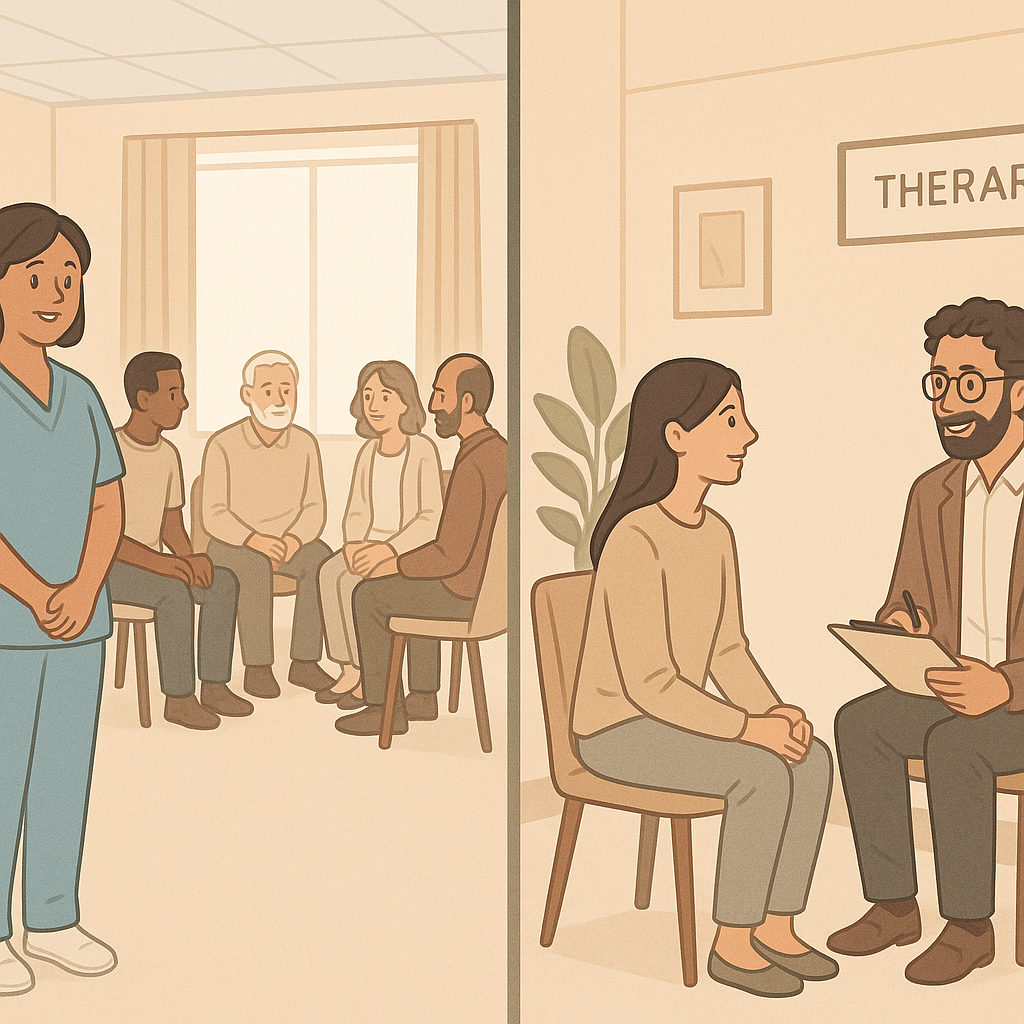When it comes to mental health care, therapy is a vital part of recovery and emotional well-being. As a nurse—especially one preparing for the NCLEX or working toward building your nursing bundle of skills—understanding the difference between group therapy and individual therapy is key. Whether you’re a registered nurse (RN nurse) in psychiatric care, a med-surg unit, or community health, this knowledge helps you advocate for your patients and support their treatment plans.
This guide explores both approaches, their benefits, and what nurses should know when working with patients receiving therapy.
🧠 What Is Individual Therapy?
Individual therapy (also called one-on-one therapy) involves a single patient working with a licensed mental health professional. Sessions are private and allow for deep exploration of personal experiences, emotions, and behaviors.
💡 Key Benefits:
- Personalized attention and tailored goals
- Greater privacy and confidentiality
- Focus on specific trauma or mental health conditions
- Flexible pacing for progress
👥 What Is Group Therapy?
Group therapy involves a small group of patients (usually 6–12) led by one or more therapists. It offers a supportive environment where individuals can share experiences, learn from others, and build coping skills.
💡 Key Benefits:
- Peer support and shared experiences
- Reduces isolation and stigma
- Improves social and communication skills
- Cost-effective and widely available
📚 What Nurses Should Know: NCLEX & Clinical Insights
Whether you’re an RN nurse on the floor or preparing for the NCLEX, you’ll encounter patients participating in either or both forms of therapy. As a nurse, your role is not to lead therapy—but to support, educate, and observe.
🩺 Nurse Responsibilities:
- Encourage participation in therapy sessions
- Monitor patient behavior before and after therapy
- Communicate with the mental health team
- Provide patient teaching on therapy benefits
- Maintain confidentiality and uphold ethical standards
🔍 NCLEX Tip: Questions may ask you to identify appropriate interventions or observe signs of improvement after therapy (e.g., “The patient begins interacting more with peers”).
🔄 Comparing Group vs. Individual Therapy
| Feature | Individual Therapy | Group Therapy |
|---|---|---|
| Focus | One patient | Shared group experience |
| Privacy | High | Moderate (group setting) |
| Cost | Higher | More cost-effective |
| Peer Support | No | Yes |
| Common in Settings | Psych units, outpatient clinics | Psych units, substance use programs |
| Nurse Involvement | Support before/after sessions | Support and observation during group |
🧑⚕️ Common Conditions Treated with Therapy
Both therapy types are used for a variety of mental health issues. As a registered nurse, understanding these associations is helpful:
| Condition | Preferred Therapy Type |
|---|---|
| Depression | Both |
| Anxiety Disorders | Both |
| Substance Use Disorders | Group (12-step, CBT groups) |
| PTSD or Trauma | Individual, then group |
| Schizophrenia or Bipolar Disorder | Individual + psychoeducation |
| Borderline Personality Disorder | Group (DBT groups) + individual |
📦 Add to Your Nursing Bundle: How to Support Therapy in Practice
For your nursing bundle, include practical tools that help you manage patients in therapy:
- Therapeutic Communication Cheat Sheet
- Observation Chart for Group Participation
- Patient Education Handout on therapy options
- NCLEX practice questions on therapeutic environments
These are essential tools for clinical rotations and mental health nursing.
🔑 Nurse’s Role: Support, Not Lead
While nurses are not usually the therapists, they play a key support role in helping patients stay engaged, motivated, and emotionally safe during treatment.
✅ What RN Nurses Can Do:
- Encourage open expression without judgment
- Be aware of triggers and signs of distress
- Notify mental health staff of behavior changes
- Respect patient boundaries and confidentiality
- Celebrate progress—no matter how small
📌 Key Takeaways
- Both group and individual therapy have benefits.
- Patients may benefit more from one based on their diagnosis, comfort level, and goals.
- Nurses are essential in supporting these therapies through communication, observation, and education.
- Knowledge of these therapies is regularly tested on the NCLEX.
- Add this to your nursing bundle to strengthen your mental health care skills.

